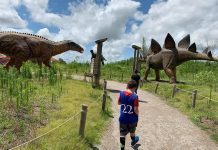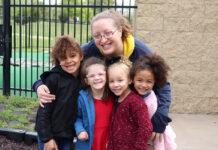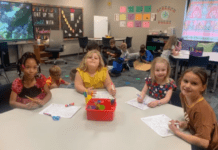Thank you to Kim Doze-Lohmann for sharing her story, journey, and experience for this guest article (originally written in 2020).
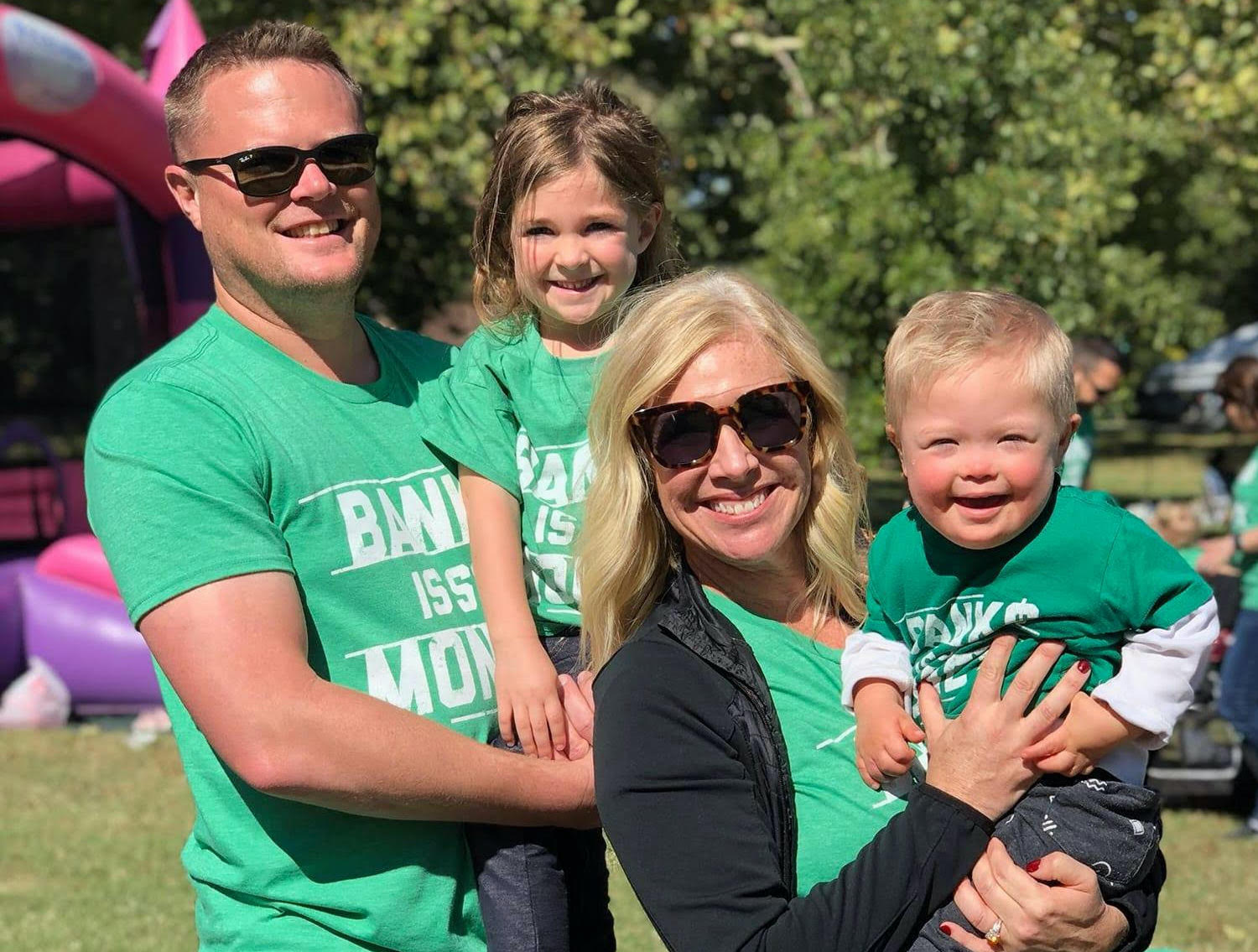 On May 3, 2017 my life changed forever. My sweet baby boy, Banks, was born with Down syndrome. I was shocked to say the least. Three years have passed and a lot has happened since I’ve learned of his diagnosis. It has certainly been an eye-opening journey that has tested me, my strength, and my faith. It has also taught me more than I ever dreamed possible.
On May 3, 2017 my life changed forever. My sweet baby boy, Banks, was born with Down syndrome. I was shocked to say the least. Three years have passed and a lot has happened since I’ve learned of his diagnosis. It has certainly been an eye-opening journey that has tested me, my strength, and my faith. It has also taught me more than I ever dreamed possible.
October is Down Syndrome Awareness Month, and I gave friends and family the opportunity to ask me questions. The good, the bad & the ugly. My answers are my truth. You could easily ask any other mom parenting a child with Down syndrome these questions and you would likely get different answers. Our children aren’t the same, our experiences aren’t the same, and our opinions aren’t the same.
First a few facts about Down syndrome:
- Down syndrome occurs when an individual has a full or partial extra copy of chromosome 21.
- Approximately one in every 700 babies in the United States is born with Down syndrome – about 6,000 each year
- Down syndrome occurs in people of all races and economic levels
- The incidence of births of children with Down syndrome increases with the age of the mother. But due to higher fertility rates in younger women, 80% of children with Down syndrome are born to women under 35 years of age
- People with Down syndrome have an increased risk for certain medical conditions such as congenital heart defects, respiratory and hearing problems, Alzheimer’s disease, childhood leukemia and thyroid conditions
- A few of the common physical traits of Down syndrome are low muscle tone, small stature, an upward slant to the eyes, and a single deep crease across the center of the palm.
- Life expectancy for people with Down syndrome has increased dramatically in recent decades – from 25 in 1983 to 60 today
- People with Down syndrome attend school, work, participate in decisions that affect them, have meaningful relationships, vote and contribute to society in many wonderful ways
- All people with Down syndrome experience cognitive delays, but the effect is usually mild to moderate and is not indicative of the many strengths and talents that each individual possesses
- Quality educational programs, a stimulating home environment, good health care and positive support from family, friends and the community enable people with Down syndrome to lead fulfilling and productive lives
Down Syndrome Q&A
Can you help clarify what the recommended language is with regard to Down Syndrome?
Absolutely, I get this question a lot. This should go without saying, but the “R” word
is NEVER appropriate. Ever.
Here’s the recommended language from the National Down Syndrome Society (NDSS):
- People with Down syndrome should always be referred to as people first. Instead of “a Down syndrome child,” it should be “a child with Down syndrome.” Banks has Down syndrome. He is NOT Down syndrome. He is NOT a Down syndrome person.
- Down syndrome is a condition or a syndrome, not a disease. People “have” Down syndrome, they do not “suffer from” it and are not “afflicted by” it.
- “Typically developing” or “typical” is preferred over “normal.” Banks is totally normal. Right now, he’s 3 years-old and LET ME TELL YOU…..the kid is THREE! Whew!
- “Intellectual disability” or “cognitive disability” has replaced “mental retardation” as the appropriate term. My opinion, while they are not offensive, I will tell you that I personally don’t love the words “intellectual disability” or “disability”. I prefer “different abilities” or “differently-abled”.
Here are some popular hashtags in the DS Community:
#NothingDownAboutIt
#MoreAlikeThanDifferent
#TheLuckyFew
#WouldntChangeAThing
#LifeisBetterWithYou
#notbroken
#HomeWithAnExtraChromie
#IAmAble
Do you have advice on how to explain Down syndrome to children?
I haven’t really had to do this yet! Since most of my friends have younger children, I’ve not (yet) been in a situation to explain it. 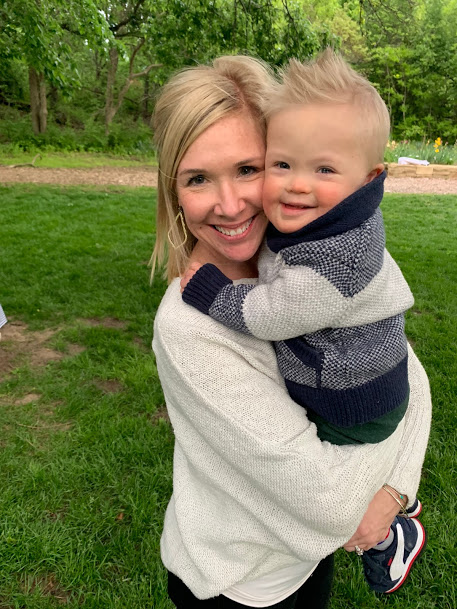 That said, I am set to speak to our kindergartner’s class this week in honor of Down Syndrome Awareness Month. My plan is to ask them what they know/think about Down syndrome (even offensive words/phrases/questions are OK), and tell them that Down syndrome is one of the (many) things that makes Banks special and unique and ask them what makes them different/special/unique. I want them to embrace the fact that it’s a good thing that not everyone is the same and that we should embrace difference in all forms.
That said, I am set to speak to our kindergartner’s class this week in honor of Down Syndrome Awareness Month. My plan is to ask them what they know/think about Down syndrome (even offensive words/phrases/questions are OK), and tell them that Down syndrome is one of the (many) things that makes Banks special and unique and ask them what makes them different/special/unique. I want them to embrace the fact that it’s a good thing that not everyone is the same and that we should embrace difference in all forms.
A little advice though, Mamas: your children learn from you. They see how you react to situations and they model your behavior. When you see a person in the grocery store who is differently-abled, and your children point or ask you questions, I would encourage you to NOT hush them. We hear you and it gives them the impression that asking questions is inappropriate when it’s not. My advice? Smile. Say hi. Prove to your children that being different isn’t bad or scary, and that it’s not mean to be curious.
If you are unsure what language is appropriate, just ask. I promise you, it’s not rude. I actually appreciate it.
How is your family different from families who don’t have a child who is differently-abled?
It’s not, outside of a few extra therapy (speech, occupational therapy and physical therapy) appointments (OK, more than a few). We fish, we hike, we go bike riding and hang at the park. We go to the lake – Banks cliff jumps and rides on the tube behind the boat (with me, for now). He loves to dance and sing and read books. He runs and plays with the kids in our neighborhood. He loves to swim. He loves to tease his sister. He loves to destroy his room when he doesn’t want to nap. Our life is not unlike yours. #MoreAlikeThanDifferent
Are there things people say that are hurtful to you that may not seem obvious?
Yes. And I fully realize this may not be a popular answer, but this is MY truth. Fair or 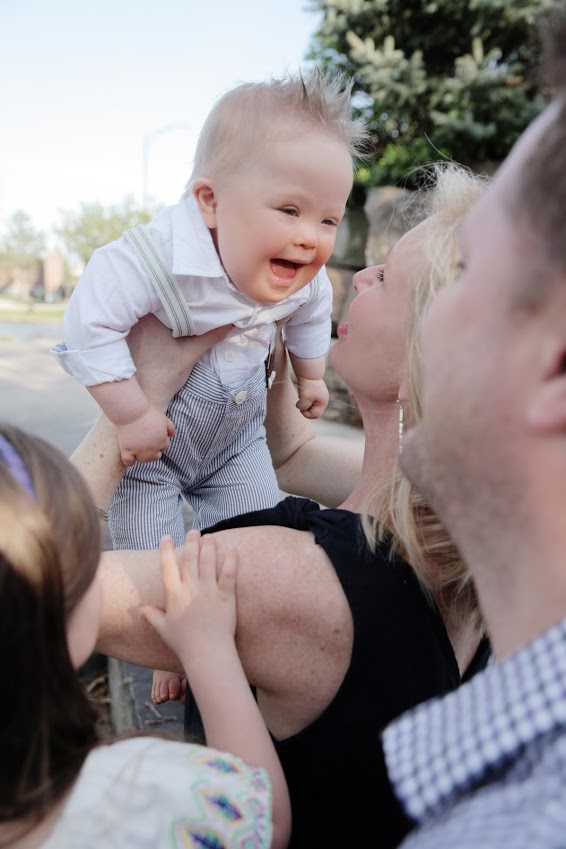 not.
not.
When someone is pregnant and is asked about whether or not they want a boy or a girl and they say, “We don’t care, all we care about is having a healthy baby.” That’s hurtful to me. Of course you want a healthy baby. I want you to have a healthy baby. You have to understand that what I hear is, “I hope this baby doesn’t have Down syndrome.” When people say that to me, it’s not personal, and I know that. That said, it’s still hurtful.
A more inclusive response would be, “We are hoping for a boy (girl), but will be happy with either!” or “We are just so excited, we don’t have a preference!”
How has this journey changed you?
Gosh, I don’t know to be honest. Digging deep, I think it would be the following:
- I have always been someone who was passionate about diversity & inclusion. Admittedly, though, I looked at it more from a gender and racial perspective. This took on a whole new meaning for me when Banks was born. I have a new appreciation for those that are differently-abled, as well as their care givers. It’s not something I thought a lot about before Banks was born.
- Often times, I’m thankful that there are physical characteristics that give an indication that Banks is differently-abled. If Banks is misbehaving in public, people assume it’s because he has Down syndrome, which is NOT true at all. He knows what is right and wrong. He’s misbehaving because he is a child who is three. Please don’t assume that a parent who is struggling with a child in public who is not behaving appropriately is not a good parent, or should discipline their child.
- I’ve become an advocate. I’ve always had opinions about things, but never felt strongly enough to really advocate for them. To push the envelope. Taking on the role of being an advocate for Banks (which was a no-brainer) has given me the confidence to advocate for other things I believe strongly in: salary negotiation training for women! Did you know that women in the U.S. make $.80 for every $1 a man makes?
- My role in ADVOCATING LIKE A MOTHER for Banks so far has not been a difficult one, but I’ve been warned about the need, and I’m ready. That said, we’ve had an amazing experience so far. He has the most amazing therapists as well as child care providers (we love Envision!). We have a strong team and I am so thankful for every one of them.
What has surprised you the most?
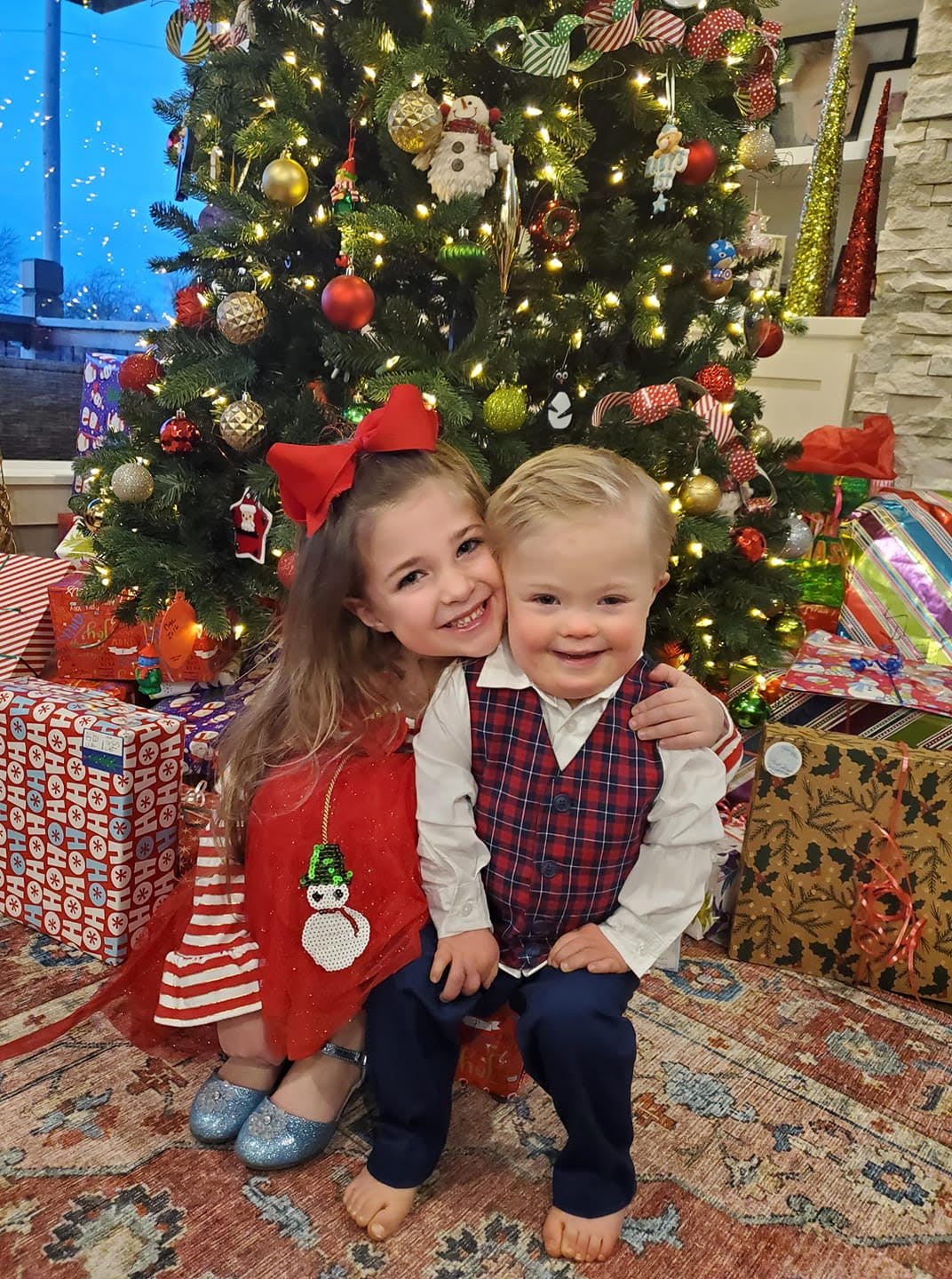
The truth has surprised me the most. When I first learned that Banks may have Down syndrome, I couldn’t imagine a day that Down syndrome wouldn’t be a part of our daily lives. Truthfully, it is not a part of our daily lives at all. I was so overwhelmed with the diagnosis that I wasn’t sure how we would ever focus on or talk about anything else ever again. In our experience, that is so far from the truth.
Even on the days that are filled with extra therapy appointments, it’s not about Down syndrome. It’s about what I (and we as moms) do for our kids. We do whatever it takes to help them achieve their very best. I’m not special. I’m not stronger. I’m just doing what moms do.
What words do you wish you’d heard from your healthcare providers when you learned of Banks’s diagnosis?
I have to be honest, the first time a medical professional uttered the words “Down syndrome” was when my OB was finishing my c-section. I looked at Banks across the room and asked if his fingers were fused together. They were – it’s called syndactyly. My OB raised his head up and yelled across the room to the nurse, “His fingers are fused? Is that a marker for Down’s?”
In that moment, everything changed.
I don’t count that as Banks’ diagnosis story, though. His official diagnosis came two weeks after he was born and came from his pediatrician (who is wonderful). The doctor visited us the night Banks was born in the hospital (and every day after that). The nurses had given him a heads up that a possible Down syndrome diagnosis had been thrown out in our presence. He arrived with a big smile on his face and said, “I want to meet this Mr. Banks!” As he was evaluating him, he said that the nurses mentioned something about Down syndrome. He talked out loud during the evaluation and after he checked every body part or vital, he would say, “Looking good, Mr. Banks”, “You’re a healthy boy, Mr. Banks”, “That’s just what I want to see ,Mr. Banks”. Then he said that it was impossible for him to confirm whether or not Banks had Down syndrome just by looking at him. It would need to be confirmed with a blood test and it would take two weeks for the results to return (TWO WEEKS???). Then he said, “Now, Banks IS showing some of the physical characteristics (ears set lower, almond shaped eyes, low tone, etc.) of Down syndrome or a related syndrome.” Then he told me how common Down syndrome is and how he hoped he DID have Down syndrome because there are so many amazing local resources and families to connect with. If it wasn’t Down syndrome then Banks would have to go through a number of tests to return a diagnosis.
Emotional and scared, he looked at my husband and I and said, “He’s a baby and he is perfect. Snuggle him and love on him.”
He personally called me two weeks later and confirmed that he had Trisomy 21 (Down syndrome).
You know what he didn’t say that is key? Sorry. He did not apologize to me for Banks having Down syndrome. He’s a very wise man.
Do you wish you would have learned about Banks’s diagnosis prior to birth?
I said this with both of my pregnancies, “We aren’t going to genetic test because we aren’t going to terminate even if there is a prenatal diagnosis of <insert any number of possible diagnosis>”. And that is true. We wouldn’t have terminated the pregnancy. That said, my answer to this question is YES, and this is why – I would have had time to mourn the baby I thought Banks was going to be. Instead, I was devastated. And sad. And scared. And I felt more alone than I have ever felt in my life. The first time I met my sweet baby boy I was devastated. And I grieved the loss of the baby I thought he was going to be on his first day in this world (and for months after) when he needed me the most. Don’t get me wrong, I have LOVED that boy from the moment I laid eyes on him (and before that), and I knew we would bond and I would be fine and get through it and love being a family of four even if it isn’t what I imagined. But in that moment, I wasn’t there for him, and that guilt is something I have to live with daily.
As a medical professional what should I tell expectant mamas/friends who have recently learned their baby will be born with Trisomy 21?
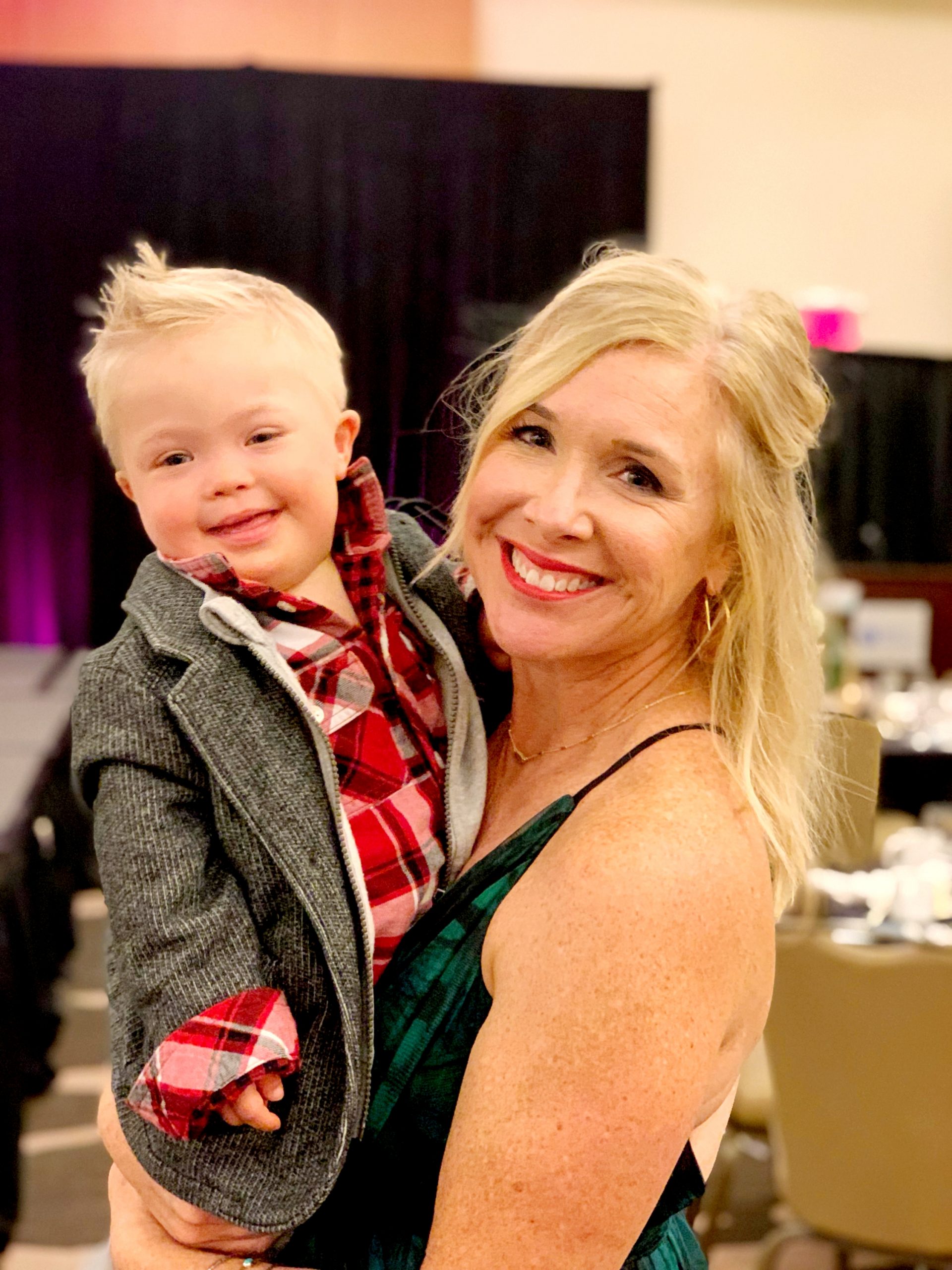 It is shocking to me the number of families who have awful diagnosis stories. Just AWFUL. That said, medical professionals are not specifically trained to give Down syndrome diagnosis news. Most of them don’t have a relationship with someone who has Down syndrome and can’t speak to the specific experience someone has who is raising a child with Down syndrome.
It is shocking to me the number of families who have awful diagnosis stories. Just AWFUL. That said, medical professionals are not specifically trained to give Down syndrome diagnosis news. Most of them don’t have a relationship with someone who has Down syndrome and can’t speak to the specific experience someone has who is raising a child with Down syndrome.
There is an amazing organization called Hope Story. They are a team of medical professionals and storytellers who have teamed up to help medical professionals help effectively deliver a Down syndrome diagnosis.
I’m in the process of filling out my application to become a Hope Advocate. This is how it works: I fill out the application and provide information/photos, etc., about myself, Banks and our family. They create folders of information about us and ship them to me. Then I visit OB/GYN offices and leave the packets. If you have a patient with a diagnosis of Down syndrome, give them a packet of information from me that will include my experiences raising a child with Down syndrome, photos of Banks, words of encouragement, etc. Having a local connection to down syndrome goes a LONG way.
When Banks was born I told all of the local organizations who reached out to me “Don’t call me, I’ll call you.” I wasn’t ready to accept or believe what was happening. My boss at the time had a friend who has a son with Down syndrome. She noticed a shared photo on social media and dropped a book of photos of her son and their family off on my front porch. I couldn’t look at it at first, but slowly started to look at it, a couple pages at a time. He was adorable. And perfect. And had a “normal” life. And siblings who loved him. And friends who adored him. It was EXACTLY what I needed, even when I wasn’t ready. I still have the book and look at it often.
If you have a friend or relative who has a down syndrome diagnosis (pre or post-natal), go to hopestory.org and find an advocate in your town who can drop the information off on your doorstep.
What is the number one thing you feel like your friends who don’t have a differently-abled child may not understand about your life or journey?
My friends know me and they know what my daily life looks like. I’m happy and (I believe) generally the same ol’ Kim I’ve always been. What I want them to know is this:
- I appreciate you letting me say the ugly/scary things that live in my head. This was especially true when Banks was first born. Trish, Heather, Ilex, Stan, Lisa, Shelley, Sam & Ashlyn. I appreciate you more than you know.
- I don’t worry about Banks 20 years from now, I worry about his big sister, Collins. Banks is going to be fine. I have major anxiety that Collins will feel “burdened” by taking care of Banks. Sometimes it’s overwhelming.
- I’m OK. I love my life. I love Banks and I honestly wouldn’t trade him for the world.
- I’m excited for your kids to know and love Banks. I’m proud that my family is going to make a meaningful impact on your family & your children.
- Sometimes it’s tough with all the appointments. Juggling therapy, doctor appointments, appointments in KC, etc., it’s overwhelming. I’m thankful for an employer that gives me the grace and flexibility my family requires.
Want to know more about our journey? Follow along on Instagram: @BanksIsSoMoney






